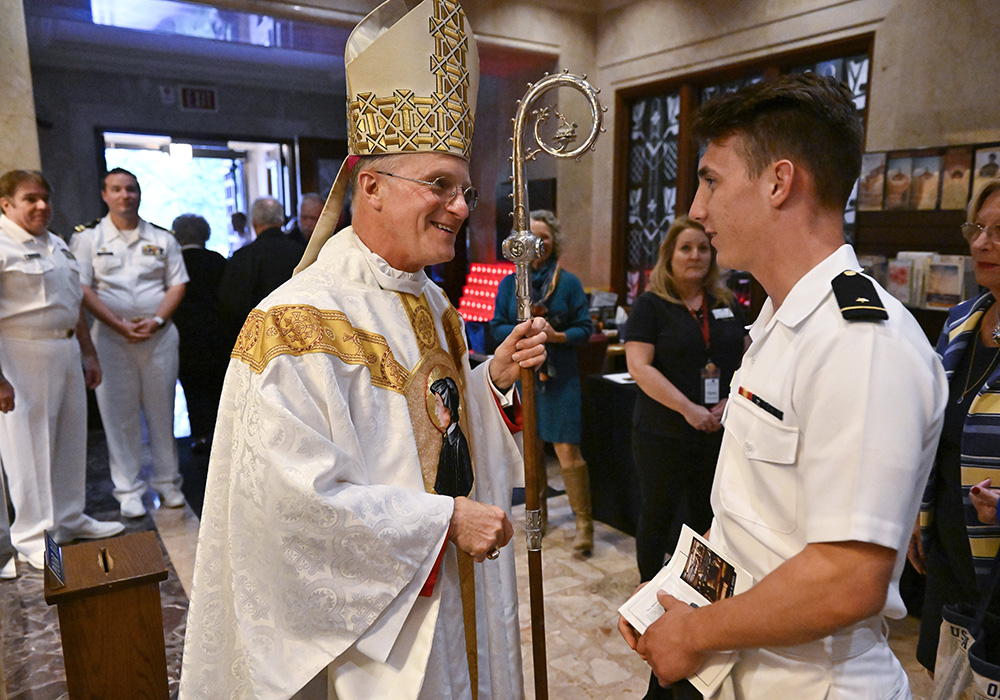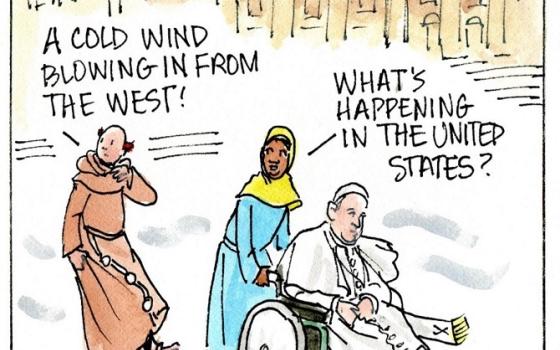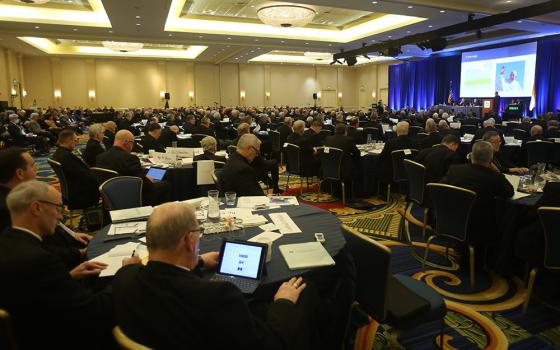
Archbishop Timothy Broglio of the U.S. Archdiocese for the Military Services greets a U.S. Naval Academy cadet midshipman after the annual Sea Services Pilgrimage Mass at the National Shrine of St. Elizabeth Ann Seton Oct. 2, 2022, in Emmitsburg, Maryland. (CNS/Courtesy of Devine Partners/Jason Minick)
The U.S. bishops have sent a clear message of rejection to Pope Francis by selecting Archbishop Timothy Broglio, who heads the Archdiocese for the Military Services, as president of the bishops' conference.
The bishops' choice of new leadership revealed the deeper ecclesiological orientation of the body. They had to decide if they wanted to be a part of the ongoing reception of the Second Vatican Council in the context of the magisterium of Pope Francis, or not, a choice made all the more obvious by the success of the synodal process so far. As papal nuncio Archbishop Christophe Pierre reminded them in his opening address, the bishops govern the church "cum Petro and sub Petro," with Peter and under Peter. They forgot that law, or ignored it, 30 minutes later.
In my many years of coming to these meetings of the U.S. bishops' conference, I have learned that relationships are usually, but not always, more important than ideology in the selection of conference officers and committee chairs. This year, however, the bishops faced clear ideological choices.
In the person of Broglio, the bishops had a candidate who rejects Pope Francis' call for a more outward focused, accompanying church, a throwback to the pre-conciliar vision of his mentor and patron, the late Cardinal Angelo Sodano.
Seattle Archbishop Paul Etienne represented a shift by the conference to a younger bishop, one who is fully on board with Pope Francis' vision. Etienne shepherds a growing, immigrant archdiocese, and has emerged as a leader among those bishops who have been most eager to embrace the engaged, outward-looking, post-clericalist church that we so desperately need.
The candidacy of Baltimore Archbishop William Lori offered the bishops a candidate almost uniquely placed to help unite the conference. A protégé of the late Cardinal James Hickey, who was a churchman of the first order, Lori came to be seen as a culture warrior in his role as supreme chaplain of the Knights of Columbus. Now he seems to be gravitating to the kind of moderate centrism that is his natural home.
Bishop Daniel Flores of Brownsville is one of the most intelligent and well-spoken bishops in the country and also represented a desire for unity. Conservative in many respects, he has engaged the teachings of Pope Francis in meaningful and illustrative ways, frequently taking to Twitter to reflect on the readings of the day and the comments of the pope. He also leads a large border diocese. I am convinced that something wonderful happens to bishops who live at the border, their horizons broaden, the relationships they build with their counterparts on the other side of the border are a prima facie witness against the idea that national borders cannot be transcended. Flores inhales literature and understands Pope Francis through their shared love of Latino culture. His selection, too, would have been a sign of the bishops' desire to come together.
Candidates for the upcoming 2022 U.S. Conference of Catholic Bishops presidential and vice presidential elections are shown clockwise from top left: Archbishop Timothy Broglio of the U.S. Archdiocese for the Military Services; Archbishop Paul Coakley of Oklahoma City; Bishop Frank Caggiano of Bridgeport, Conn.; Bishop Michael Burbidge of Arlington, Va.; San Francisco Archbishop Salvatore Cordileone; Seattle Archbishop Paul Etienne; Archbishop Gustavo García-Siller of San Antonio; Bishop Daniel Flores of Brownsville, Texas; Baltimore Archbishop William Lori; and Bishop Kevin Rhoades of Fort Wayne-South Bend, Ind. (CNS composite/photos by Tyler Orsburn; Archdiocese of Oklahoma City; Gregory A. Shemitz; Bob Roller; Dennis Callahan, Catholic San Francisco; Paul Haring; Bob Roller; Bob Roller; Tyler Orsburn; and Bob Roller)
It is difficult to overstate what a repudiation of Pope Francis the selection of Broglio to lead the conference is. He is the one bishop in the United States with long-standing tensions with the pope, tensions that goes back to Broglio's work with Sodano, who famously tried to shut down the Latin American bishops' conference CELAM and who protected the monstrous pedophile Fr. Marcial Maciel, founder of the Legionaries of Christ.
It was on Broglio's watch as nuncio to the Dominican Republic and apostolic delegate to Puerto Rico that Bishop Daniel Fernández Torres was made a bishop. Torres was forced to step down as bishop of Arecibo, Puerto Rico earlier this year. The bishop had long been a thorn in the side of his brother bishops in Puerto Rico, but his decision to publicly oppose the bishops' collective support for efforts to curb the spread of COVID-19 was a bridge too far. The pope took the unusual step of sacking him.
Broglio also supported those who harbored "conscientious objections" to getting the vaccine: "This circumstance raises the question of whether the vaccine's moral permissibility precludes an individual from forming a sincerely held religious belief that receiving the vaccine would violate his conscience," he wrote. "It does not."
Advertisement
That misstates the issue. Everyone has a right to not be vaccinated, but they cannot then assert a right to endanger others by that refusal. Just as someone with a conscientious objection to war does not, in turn, get to undermine the war effort, a soldier who does not want to get vaccinated cannot undermine the military's effort to protect the health and well-being of its soldiers.
Broglio also seems obsessed with the issue of homosexuality, more specifically, with making sure that no one mistake pastoral outreach and accompaniment for anything approaching solidarity. After the release of Evgeny Afineevsky's documentary "Francesco," in which the pope expressed some commonplaces about not ostracizing gays and lesbians, Broglio issued a "clarification" of pastoral statements the pope made to the movie director, emptying them of their plain meaning. Who does that?
Early in Francis' pontificate, it was common to encounter these kinds of clarifications, in which someone who disagrees with the pope "explains" that "what the pope meant to say" was something quite different from what he actually said. It was common among members of the commentariat, but not among bishops. I do not remember bishops clarifying what Pope John Paul II said, do you? It is insulting.
This is the man the U.S. bishops have chosen to lead them for the next three years, a tenure that will continue through the 2024 election. Lord help us all.
The U.S. bishops' conference cannot survive as the Republican Party at prayer. It is time for a change but the change the bishops selected was to revert. It is pitiful.





